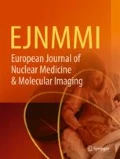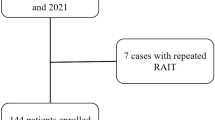Abstract
Purpose
Carbimazole ameliorates hyperthyroidism but reduces radioiodine uptake and adversely affects the outcome of simultaneous radioiodine therapy. We explored whether withdrawal of carbimazole for 3 days can restore the outcome of radioiodine treatment without concurrent exacerbation of hyperthyroidism. By generating three groups with comparable radioiodine uptake, we also investigated whether the effect of carbimazole depends on the radioiodine uptake.
Methods
Stratified by a radioiodine uptake >30%, 227 consecutive adult patients were prospectively assigned to radioiodine therapy (target dose 200 Gy) without, on or 3 days off carbimazole. Patients were clinically (Crooks-Wayne score) and biochemically (T3, fT4, TSH) followed up after 3, 6 and 12 months. Primary endpoint was outcome 12 months after radioiodine therapy.
Results
A total of 207 patients completed follow-up (toxic nodular goitre, n=117; Graves’ disease, n=90). The overall success rate was 71.5%. Patients without and 3 days off carbimazole had similar biochemical (81.4% and 83.3%, respectively; p=0.82) and clinical outcomes [median (range) Crooks-Wayne score 0 (0–16) and 1 (0–10), respectively; p=0.73], which were both higher than in patients on carbimazole [42.6%, p<0.001; Crooks-Wayne score 3 (0–30), p<0.03]. Time to achieve cure was delayed on carbimazole. No changes in thyroid hormone levels occurred after 3 days’ discontinuation of carbimazole. Logistic regression revealed that all observed cure rates were independent of entity, sex, age, thyroid volume, radioiodine uptake, radioiodine half-life, fT4, T3 and TSH.
Conclusion
Patients under carbimazole treatment can be referred for radioiodine therapy after withdrawal of carbimazole for only 3 days. Three days of carbimazole withdrawal is long enough to restore the success of radioiodine therapy and short enough to avoid the risk of exacerbation of hyperthyroidism.




Similar content being viewed by others
References
Solomon B, Glinoer D, Lagasse R, Wartofsky L. Current trends in the management of Graves’ disease. J Clin Endocrinol Metab 1990;70:1518–1524
Cooper DS. Antithyroid drugs. N Engl J Med 2005;352:905–917
Clerc J, Izembart M, Dagousset F, Jais JP, Heshmati HM, Chevalier A, et al. Influence of dose selection on absorbed dose profiles in radioiodine treatment of diffuse toxic goiters in patients receiving or not receiving carbimazole. J Nucl Med 1993;34:387–393
Sabri O, Zimny M, Schreckenberger M, Reinartz P, Ostwald E, Buell U. Radioiodine therapy in Graves’ disease patients with large diffuse goiters treated with or without carbimazole at the time of radioiodine therapy. Thyroid 1999;9:1181–1188
Sabri O, Zimny M, Schulz G, Schreckenberger M, Reinartz P, Willmes K, et al. Success rate of radioiodine therapy in Graves’ disease: the influence of thyrostatic medication. J Clin Endocrinol Metab 1999;84:1229–1233
Razvi S, Basu A, McIntyre EA, Wahid ST, Bartholomew PH, Weaver JU. Low failure rate of fixed administered activity of 400 MBq 131I with pre-treatment with carbimazole for thyrotoxicosis: the Gateshead Protocol. Nucl Med Commun 2004;25:675–682
Connell JM, Hilditch TE, Robertson J, Coghill G, Alexander WD. Radioprotective action of carbimazole in radioiodine therapy for thyrotoxicosis—influence of the drug on iodine kinetics. Eur J Nucl Med 1987;13:358–361
Goolden AW, Fraser TR. Effect of pretreatment with carbimazole in patients with thyrotoxicosis subsequently treated with radioactive iodine. Br Med J 1969;3:443–444
Burch HB, Solomon BL, Wartofsky L, Burman KD. Discontinuing antithyroid drug therapy before ablation with radioiodine in Graves disease. Ann Intern Med 1994;121:553–559
Wilson R, McKillop JH, Buchanan LM, Bradley H, Smith WE, Thomson JA. The effect of carbimazole therapy on interleukin 2, interleukin 2 receptors and free radicals. Autoimmunity 1990;8:3–7
Abalovich M, Llesuy S, Gutierrez S, Repetto M. Peripheral parameters of oxidative stress in Graves’ disease: the effects of methimazole and 131 iodine treatments. Clin Endocrinol (Oxf) 2003;59:321–327
Nordyke RA, Gilbert FI Jr. Optimal iodine-131 dose for eliminating hyperthyroidism in Graves’ disease. J Nucl Med 1991;32:411–416
Sabri O, Zimny M, Schreckenberger M, Reinartz P, Nowak B, Ostwald E, et al. Characterization of therapy failures in radioiodine therapy of Graves’ disease without simultaneous antithyroid agents. Nuklearmedizin 2001;40:1–6
Walter MA, Christ-Crain M, Muller B, Muller-Brand J. Radioiodine uptake and thyroid hormone levels on or off simultaneous carbimazole medication: a prospective paired comparison. Nuklearmedizin 2005;44:33–36
Toft AD. Clinical practice. Subclinical hyperthyroidism. N Engl J Med 2001;345:512–516
Walter MA, Christ-Crain M, Eckard B, Schindler C, Nitzsche EU, Muller-Brand J, et al. Radioiodine therapy in hyperthyroidism: inverse correlation of pretherapeutic iodine uptake level and post-therapeutic outcome. Eur J Clin Invest 2004;34:365–370
Bockisch A, Jamitzky T, Derwanz R, Biersack HJ. Optimized dose planning of radioiodine therapy of benign thyroidal diseases. J Nucl Med 1993;34:1632–1638
Marinelli LD. Dosage determination in the use of radioactive isotopes. J Clin Invest 1949;28:1271–1280
Crooks J, Wayne EJ, Robb RA. A clinical method of assessing the results of therapy in thyrotoxicosis. Lancet 1960;1:397–401
Imseis RE, Vanmiddlesworth L, Massie JD, Bush AJ, Vanmiddlesworth NR. Pretreatment with propylthiouracil but not methimazole reduces the therapeutic efficacy of iodine-131 in hyperthyroidism. J Clin Endocrinol Metab 1998;83:685–687
Korber C, Schneider P, Korber-Hafner N, Hanscheid H, Reiners C. Antithyroid drugs as a factor influencing the outcome of radioiodine therapy in Graves’ disease and toxic nodular goitre? Eur J Nucl Med 2001;28:1360–1364
Bonnema SJ, Bennedbaek FN, Veje A, Marving J, Hegedus L. Propylthiouracil before 131I therapy of hyperthyroid diseases: effect on cure rate evaluated by a randomized clinical trial. J Clin Endocrinol Metab 2004;89:4439–4444
Hancock LD, Tuttle RM, LeMar H, Bauman J, Patience T. The effect of propylthiouracil on subsequent radioactive iodine therapy in Graves’ disease. Clin Endocrinol (Oxf) 1997;47:425–430
Tuttle RM, Patience T, Budd S. Treatment with propylthiouracil before radioactive iodine therapy is associated with a higher treatment failure rate than therapy with radioactive iodine alone in Graves’ disease. Thyroid 1995;5:243–247
Santos RB, Romaldini JH, Ward LS. Propylthiouracil reduces the effectiveness of radioiodine treatment in hyperthyroid patients with Graves’ disease. Thyroid 2004;14:525–530
Marcocci C, Gianchecchi D, Masini I, Golia F, Ceccarelli C, Bracci E, et al. A reappraisal of the role of methimazole and other factors on the efficacy and outcome of radioiodine therapy of Graves’ hyperthyroidism. J Endocrinol Invest 1990;13:513–520
Koornstra JJ, Kerstens MN, Hoving J, Visscher KJ, Schade JH, Gort HB, et al. Clinical and biochemical changes following 131I therapy for hyperthyroidism in patients not pretreated with antithyroid drugs. Neth J Med 1999;55:215–221
Author information
Authors and Affiliations
Corresponding author
Rights and permissions
About this article
Cite this article
Walter, M.A., Christ-Crain, M., Schindler, C. et al. Outcome of radioiodine therapy without, on or 3 days off carbimazole: a prospective interventional three-group comparison. Eur J Nucl Med Mol Imaging 33, 730–737 (2006). https://doi.org/10.1007/s00259-006-0092-8
Received:
Accepted:
Published:
Issue Date:
DOI: https://doi.org/10.1007/s00259-006-0092-8




